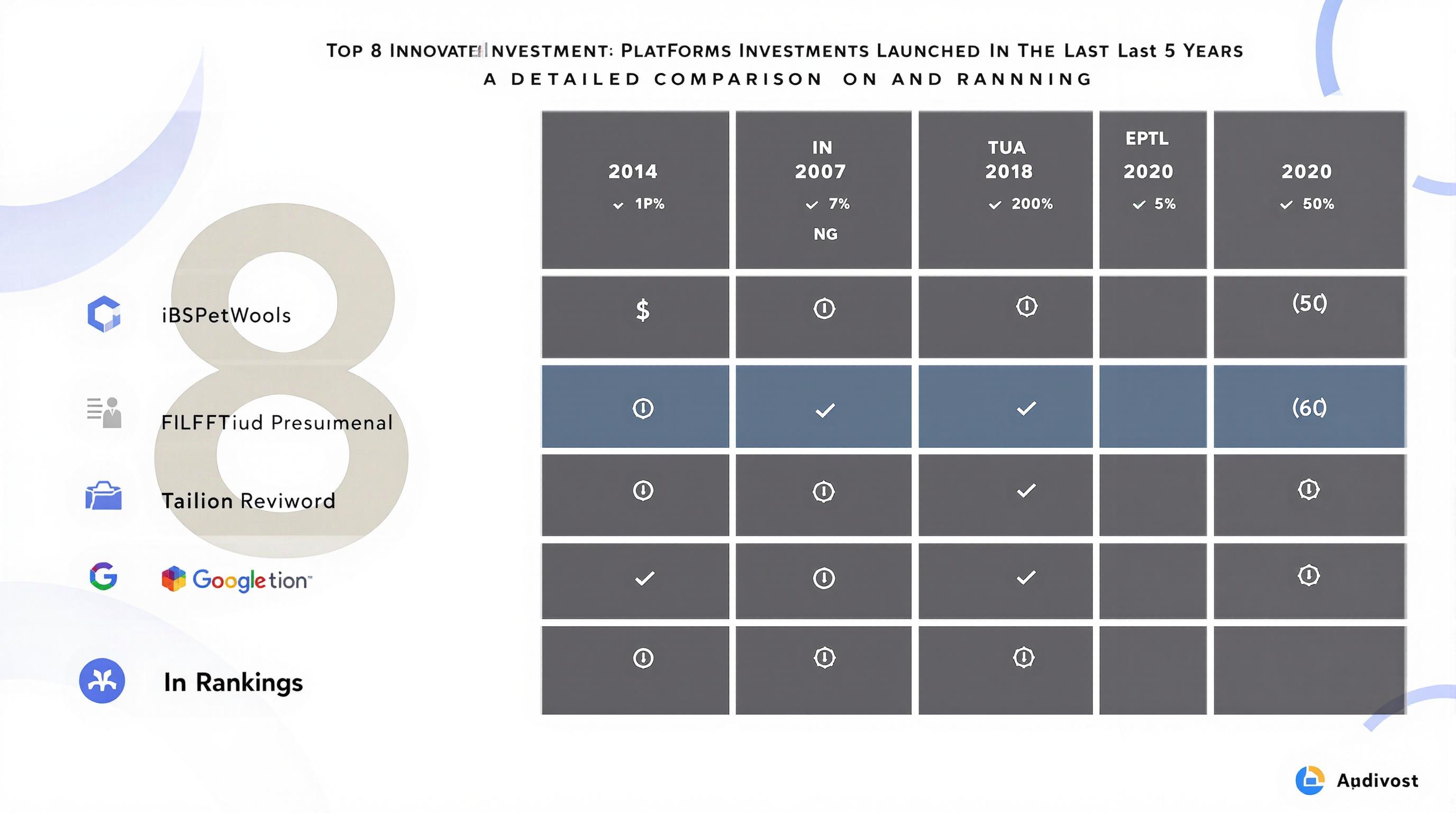Related Articles
- How Climate Change Litigation Is Reshaping International Investment Risk Assessment and Capital Flows
- 7 Revolutionary Smart Home Investments from the Last Five Years That Generate Steady Passive Income in 2024
- How Virtual Reality Is Changing Family Conversations About Inheritance and Future Financial Transparency
- The Influence of Seasonal Affective Disorder on Designing Adaptive Support Networks for Mental Wellness
- Top 5 Game-Changing Green Bonds Released Since 2019 Disrupting Conventional Sustainable Finance Models
- 6 Groundbreaking Global Robo-Advisors Unveiled Since 2019 Transforming Automated Wealth Management
Top 8 Innovative Investment Platforms Launched in the Last 5 Years: Detailed Comparison and Rankings
Top 8 Innovative Investment Platforms Launched in the Last 5 Years: Detailed Comparison and Rankings
Top 8 Innovative Investment Platforms Launched in the Last 5 Years: Detailed Comparison and Rankings
Introduction to Modern Investment Platforms
The investment landscape has undergone remarkable transformation over the past five years, driven by technology and innovation. New platforms have democratized access to various asset classes, making investing more accessible to everyday individuals. These platforms utilize AI, blockchain, and user-friendly interfaces to attract a broader audience beyond traditional investors.
These innovations encourage financial literacy and inclusion, breaking barriers such as high entry minimums and complex financial jargon. The surge of fintech startups focusing on investments reflects a growing demand for faster, smarter, and more transparent investment options. As a result, investors today can customize portfolios and access alternative assets with ease.
In this article, we evaluate the top 8 investment platforms launched in the last five years based on innovation, user experience, fees, and returns. Each platform offers distinctive features tailored to different investor profiles and goals. This comprehensive comparison aims to help users make informed decisions aligned with their financial ambitions.
1. Robinhood
Overview: Launched in 2018, Robinhood revolutionized commission-free stock trading in the U.S. Its mobile-first design targeted younger investors seeking simple access to equities and ETFs.
Features: Robinhood provides real-time market data, options trading, fractional shares, and cryptocurrency support, making it an all-in-one platform for diverse investments. Its intuitive app interface lowers the entry barrier for beginners.
Evaluation: Despite controversy around trading halts and outages, Robinhood has spurred an investing culture among millennials. Its zero-commission model pressured established brokers to reduce fees. However, some users may find its educational resources limited for advanced investing strategies.
Source: Investopedia
2. Acorns
Overview: Founded in 2018, Acorns specializes in micro-investing by rounding up spare change from everyday transactions into diversified portfolios. This approach encourages consistent saving and investing habits.
Features: Acorns blends automated investing with personalized educational content. Portfolios are constructed using ETFs covering stocks and bonds, suited to risk tolerance levels. Additional features include retirement accounts and checking account integrations.
Evaluation: Acorns appeals to novice investors by simplifying investment into easy, manageable increments. While fees can be relatively high for small balances, the behavioral impact of habitual investing offsets costs for many users.
Source: Forbes
3. Public.com
Overview: Launched in 2019, Public.com stands out by combining social networking with investing, fostering community engagement among users who share insights and strategies.
Features: The platform enables commission-free trading of stocks and ETFs with a social feed where investors can follow friends and market influencers. Public.com also emphasizes fractional shares to encourage diversification.
Evaluation: Public’s unique social elements enrich the investment experience, making it ideal for those who value community and collaborative learning. However, the platform currently offers fewer asset options compared to some competitors.
Source: Public.com
4. SoFi Invest
Overview: SoFi Invest, part of the SoFi financial ecosystem launched in 2019, offers an integrated platform for active investing, automated portfolios, and cryptocurrency trading.
Features: Its multi-faceted services include commission-free stock and ETF trading, robo-advisor capabilities, and cryptocurrency exposure — all backed by educational resources and member benefits like career coaching.
Evaluation: SoFi Invest's strength lies in its comprehensive financial wellness approach, aiding members beyond investing. The platform is especially suitable for younger professionals seeking a broad financial toolkit.
Source: SoFi
5. Yieldstreet
Overview: Yieldstreet, founded in 2019, focuses on alternative investments such as real estate, art, legal finance, and marine assets. It opens access to institutional-grade deals to retail investors.
Features: The platform offers a diverse range of vetted private market opportunities with relatively low minimum investments. Yieldstreet utilizes data-driven underwriting to manage risk for its crowdfunding model.
Evaluation: Yieldstreet appeals to investors seeking portfolio diversification beyond traditional stocks and bonds. While potentially higher yielding, its alternative assets carry unique risks and less liquidity.
Source: Yieldstreet
6. OpenInvest
Overview: OpenInvest launched in 2018 with a mission to combine personalized impact investing with automated portfolio management, allowing users to align investments with their values.
Features: Users can customize portfolios based on environmental, social, and governance (ESG) criteria while benefiting from low-cost ETF allocations and automated rebalancing. OpenInvest also provides transparent reporting on impact metrics.
Evaluation: OpenInvest is ideal for socially conscious investors seeking easy portfolio customization without sacrificing performance. Its emphasis on transparency and values-driven choices distinguishes it in the robo-advisor space.
Source: OpenInvest
7. Titan
Overview: Titan launched in 2019 to provide active management usually reserved for high-net-worth individuals via an app that combines hedge fund strategies with retail investing.
Features: Titan offers actively managed growth portfolios focused on high-conviction stock picks with a team-led approach. It supports fractional shares and automatic dividends reinvestment, all transparently communicated.
Evaluation: Titan suits investors looking for professional asset management without extreme fees or minimums. However, the emphasis on growth stocks entails higher volatility, so risk tolerance is key.
Source: Titan
8. Wealthsimple
Overview: Although Wealthsimple started internationally before 2018, its U.S. platform launched in late 2019, bringing automated investing and financial advice to American investors with a fresh perspective.
Features: Wealthsimple combines robo-advisor portfolios with socially responsible investing options, tax-loss harvesting, and integrated financial planning tools available through a sleek user interface.
Evaluation: Wealthsimple is a strong contender for those seeking a holistic, easy-to-use platform that emphasizes both financial returns and social impact. The free management for the first $5,000 is an attractive entry point.
Source: Wealthsimple
Conclusion: Selecting the Right Platform
Choosing an investment platform depends heavily on individual goals, risk appetite, and desired features. For beginners aiming for simple stock trading, Robinhood and SoFi offer accessibility and broad functionality. For those interested in social investing, Public.com and OpenInvest excel.
Investors seeking alternatives or professional management might prefer Yieldstreet or Titan, emphasizing diversification and active strategies. Meanwhile, micro-investors appreciate Acorns for turning spare change into portfolio growth, while Wealthsimple balances ease with comprehensive financial planning.
Ultimately, the innovation witnessed in these platforms has lowered barriers and enriched options, empowering investors to take control of their financial futures with confidence and flexibility.





